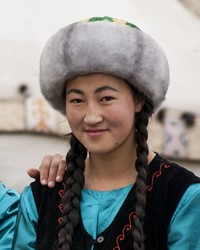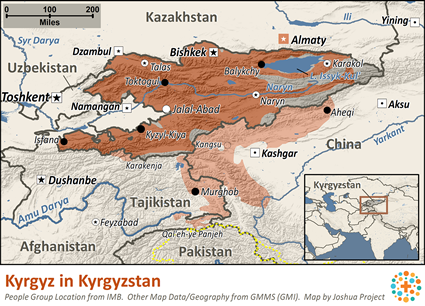The name "Kyrgyz" means "the descendants of forty maidens." The Kyrgyzstan flag has forty sun rays to represent the Kyrgyz heritage. Although they are related to Kazakh and other Turkic peoples of the region, the Kyrgyz look very much like the Mongols. More than any other Central Asian people, the Kyrgyz have clung to their traditional way of life as nomadic cattle raisers. They have also maintained their tribal organization. Today, the Kyrgyz live in one of the highest plateaus of the world.
During its 72 years under Communist rule, the Kyrgyz population grew to four times its original size. Hundreds of towns and villages were built as many abandoned their traditional nomadic lifestyles.
Since the land is generally unsuitable for farming, many rural Kyrgyz live as nomadic cattle raisers, following their herds from pasture to pasture. They depend entirely on their animals for survival. Fortunately, they have particularly hardy and adaptable breeds of sheep, goats, yaks, horses and camels. The animals are used for both food and exchange. They also provide an important means of transportation in places where paved roads don't exist.
The nomads travel as extended family units and live in portable felt tents, or yurts. The summers are short on the plateau, and there are only about 60 days in which the ground is not covered in snow. During this season, the families tend to camp close together. However, during the winter months, families live scattered away from each other so that they might best utilize the scarce grassland.
The Kyrgyz women enjoy more freedoms than do most other Central Asian women. For example, they are not required to wear veils. They are allowed to talk to men, and they may freely ride about on the grasslands. They work hard, and their position in the household is important and respected.
Women are held in high esteem once they are married. However, bride stealing is still in practice in the region. A young man may abduct a single woman and take her home. Once she has spent one night there, she is presumed to have lost her virginity and therefore is unwanted by other men in society. She becomes a "kelin" or a new bride for the first year and she is unable to even speak the name of her father-in-law. She is a live-in servant and expected to get pregnant within the first year. Once she has borne children, she moves up in status. This practice is officially illegal, but it still happens, mostly in rural areas.
The men devote themselves almost entirely to caring for the livestock. They dress in baggy leather pants and coarse shirts. They also wear outer coats made of cotton or wool. Embroidered felt skull caps are common; however, on important occasions, the wealthier men may wear tall steeple-crowned hats made of felt or velvet and embroidered with gold. Their favorite gear includes their belts, saddles, and bridles which are sometimes covered with gold and precious stones. While the women dress in the same style clothing as the men, their shirts are usually longer and go all the way down to their heels.
Music, dance and storytelling are important parts of the Kyrgyz culture. Verbal folklore has been very well developed over the years. The Kyrgyz have the longest oral epic in the word entitled "Manas." It contains 100,000 lines of verse. Folk tales are often sung, accompanied by a three-stringed guitar called a komuz.
Among the men, hunting with the use of a golden eagle is very popular, and a well-trained eagle holds great value.
Consecutive waves of Islamization have taken place since the Arabs first invaded Talas in 751 when many Kyrgyz tribes were still in Siberia. The present wave of Islamization in Kyrgyzstan is one of the most intense that the north has ever experienced. People who were only Muslim by name are now learning many of the more intricate practices, creeds and doctrines.
Soviets were never able to change Kyrgyz spiritual beliefs, even though they tried a number of methods including changing the alphabet, outlawing religious activity, and propaganda. Since Kyrgyzstan gained independence from the USSR in 1990, they have built over 3000 new mosques.
Today, most Kyrgyz still consider themselves to be Muslim. However, they strongly hold onto shamanistic and Tengrism practices. (Shamanism is the belief that there is an unseen world of gods, demons, and ancestral spirits. Tegrism is a belief system that coincides with the faith expressed throughout the biblical book of Genesis.) Many people still turn to mediums and seers to cure sickness with magic, communicate with powers, and control events. This spiritual climate has made it necessary for new Kyrgyz Christian believers to deal with and forsake these spirits.
The Kyrgyz epic hero Manas has taken on god-like status in some parts of Kyrgyzstan. His story reveals many practices and beliefs of pre-Islamic Kyrgyz. There have been some comparisons made between the biblical "Manasseh son of Jacob" (Genesis 48) and the Kyrgyz "Manas son of Jakyb".
There is ongoing conflict between Kyrgyzstan and neighboring Tajikistan regarding water rights. An excellent ministry would be to help the Kyrgyz people with water purification.
Once considered one of the freest of the liberated Central Asian countries after the USSR dissolved, Kyrgyzstan is facing challenges with keeping a free press.
Pray for the Lord to bless the Kyrgyz people with clean water as well as the Water of Life.
Pray that local believers in Kyrgyzstan would be deeply discipled and from that mobilized to disciple more of their own people.
Ask the Lord of the harvest to send dedicated laborers into Kyrgyzstan.
Pray for effectiveness of the JESUS Film and gospel recordings among the Kyrgyz.
Ask God to anoint the gospel as it goes forth via radio.
Pray for God to give dreams of the holy and victorious savior to Kyrgyz family leaders.
Scripture Prayers for the Kyrgyz in Kyrgyzstan.
https://en.wikipedia.org/wiki/Kyrgyz_people
https://www.aljazeera.com/features/2024/7/18/in-kyrgyzstan-an-unprecedented-crackdown-on-free-press-raises-alarm
| Profile Source: Joshua Project |


























